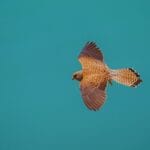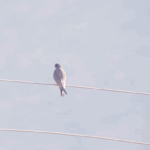After many years of continuous efforts and collaboration among various stakeholders — including decision-makers, law enforcement, research and scientific institutions, and national organizations working in nature protection (together forming the National Anti-Poisoning Working Group) — Albania has finally adopted its first Action Plan against Poisoning. The plan was officially approved by the Ministry of Tourism and Environment through Ministerial Order No. 142, dated 11.04.2025, titled “On the Approval of the Action Plan for the Protection from Poisoning of Endangered and Endemic Species of Wild Fauna in Albania, 2025–2035.”
THE ISSUE OF POISONING IN ALBANIA
Poisoning represents a serious threat to Albania’s wildlife, impacting species such as wolves, bears, vultures, and many other scavengers. It has affected not only wild animals but also domestic and stray animals. The widespread use of poison across Albania has caused the death of a broad range of species in natural habitats, rural landscapes, and even urban areas throughout the country.
Vultures have been the group most severely affected by poisoning. Once widespread across Albania, all four vulture species — the Griffon Vulture, Cinereous Vulture, Bearded Vulture, and Egyptian Vulture — have suffered dramatic declines. Today, only the Egyptian Vulture continues to breed in the country, and its population has experienced a significant decrease. Currently, just five pairs of Egyptian Vultures are known to breed in a few regions of southern Albania.
Despite the widespread use of poison and its devastating impact on wildlife, no cases have been prosecuted to date in Albania. For over 30 years, this was largely due to weak legislative coverage of the issue. Poisoning was only formally recognized as an administrative violation in 2019, under Law No. 10006, dated 23.10.2008, “On the Protection of Wild Fauna.” Since then, efforts have focused on strengthening legislation and developing policies and mechanisms to combat poisoning.
THE ACTION PLAN FOR THE PROTECTION OF ENDANGERED AND ENDEMIC SPECIES OF WILD FAUNA IN ALBANIA, 2025–2035
The Action Plan for the Protection of Endangered and Endemic Species of Wild Fauna in Albania, 2025–2035 sets out the necessary policies and actions to combat poisoning over the next ten years.
It defines 16 strategic directions, focusing on expanding knowledge about the origin and effects of poison baits; adopting preventive, deterrent, training, inspection, supervision, and awareness-raising measures; establishing procedures for evidence collection and operational protocols; and increasing control over the use of both legal and illegal toxic substances, among other actions.
Additionally, the Action Plan introduces a chain of custody framework for managing poisoning cases — a mechanism that is currently lacking for other types of environmental crimes in Albania. It also includes operational protocols to ensure the effective management and follow-up of poisoning incidents.
Implementation of the Action Plan will be closely monitored by the National Anti-Poisoning Working Group, operating as an integral part of the National Fauna Council, an advisory body established in 2019.
THE IMPORTANCE OF THE ACTION PLAN
Thanks to the Action Plan for the Protection of Endangered and Endemic Species of Wild Fauna in Albania, 2025–2035, the issue of poisoning — once largely unaddressed — is now being tackled through appropriate policies, mechanisms, and structures. Nevertheless, the success of the Action Plan depends entirely on its full and proper implementation.
Taulant Bino, President of the Albanian Ornithological Society (AOS) and the principal compiler of the Action Plan, states:
“The approval of the Action Plan marks a significant achievement, reflecting years of effort by policy-making institutions, environmental organizations such as AOS, academic institutions, and others. Albania now has an appropriate legal, strategic, and institutional framework in place to combat wildlife poisoning. However, there is still a long road ahead to build, strengthen, and enhance institutional capacities to ensure the Action Plan’s successful implementation and the broader legal framework’s effectiveness.”
The approval of the Action Plan also stands as a testament to the sustained collaboration between institutions and civil society, emphasizing the importance of persistence and cooperation among all stakeholders. This achievement can serve as a model for addressing other conservation challenges in Albania.
Klodiana Marika, Director of Nature and Forests at the Ministry of Tourism and Environment and a member of the National Anti-Poisoning Working Group, adds:
“The adoption of the Anti-Poisoning Action Plan represents the culmination of joint efforts between the Ministry of Tourism and Environment and the Albanian Ornithological Society. This Action Plan builds on a series of earlier amendments to the national legal framework, including revisions to the Law on the Protection of Wild Fauna and provisions in the Criminal Code. In my view, the progress made through anti-poisoning initiatives serves as a prerequisite for broader conservation efforts, particularly in combating wildlife poisoning and safeguarding biodiversity. While adapting the national legal framework and strengthening the strategic framework are important steps forward, further action is needed — especially in prevention, detection, prosecution, and raising public awareness. Achieving this requires strong cooperation among actors and partners, as well as continuous efforts to build institutional capacity.”
As a country aspiring to join the European Union, Albania can leverage such successes to meet the criteria and obligations required for membership.
Klodiana Marika further notes:
“I see this Action Plan as another important step in aligning Albania’s national legal framework with that of the European Union on nature protection issues.”
THE ROLE OF THE BALKANDETOX LIFE PROJECT
Much of the groundwork leading to the approval of the Action Plan was supported by the BalkanDetox LIFE project — not only financially, but also through the provision of key platforms and tools essential to the process.
The project facilitated numerous meetings of the National Anti-Poisoning Working Group (NAWG), during which the group collaborated on drafting the Action Plan and shaping the most effective strategy for its adoption.
Additionally, the BalkanDetox LIFE project enabled the NAWG to access operational protocol models from Spain for managing poisoning cases. These were adapted to the Albanian context and included as an annex to the Action Plan.
The approval of the Action Plan for the Protection from Poisoning of Endangered and Endemic Species of Wild Fauna in Albania, 2025–2035 stands as one of the major achievements of the BalkanDetox LIFE project’s implementation in the country.







